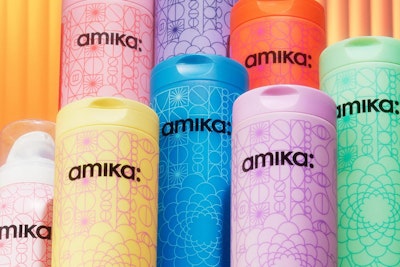Amika
Refillable hair care products, commitment to be Net Zero by 2030

Amika's Sustainability Rating
Acceptable
Ingredients
amika has made some ingredient commitments to lower its environmental impact, including by avoiding parabens, phthalates, and sulfates, and by reducing use of uncertified palm oil or palm oil-derived ingredients. Despite these commitments, it still uses many ingredients that pose a significant threat to the climate, including: microplastics, petrochemical-based ingredients, uncertified palm oil-derived ingredients, and hydrofluorocarbon, a potent greenhouse gas. Its products incorporate some biobased and organic ingredients. It carries products that have certifications from Leaping Bunny. amika is a B Corp.
Containers & Packaging
amika hasn't made any efforts to concentrate its products or minimize its containers, which increases shipping emissions and packaging volumes. It has stated goals to reduce shipping emissions by reducing air shipping in its supply chain. amika uses primarily plastic for its product containers, which increases waste and emissions, though it notes that some is majority recycled-content. Commons wasn't able to find evidence of other eco-friendly packaging materials for this brand.
Energy & Water Use
amika shares information on its energy strategy. It uses renewable energy to power an unknown portion of its production sites and corporate offices. amika has general plans to expand use of renewable energy in its supply chain by working with suppliers. It implements general water and energy efficiency measures in its production sites. amika has a global production span, which is standard for the industry.
Refill & Reuse
amika utilizes alternative models for most products to avert waste, including promoting refills and offering reusable containers, and offering a takeback program. Its takeback partnership with Terracycle allows customers to send in containers that aren't curbside recyclable, such as its refill pouches. It offers bulk sizes for some products, which may help reduce packaging waste.
Slow Cleaning
amika doesn't frequently release seasonal or new products, which helps prevent production of excess inventory.
Marketing
Commons is still evaluating this brand's marketing emails.
Transparency & Reporting
amika has a prominent sustainability page with comprehensive details on its climate strategy. It publishes an annual report with a clear, impact-driven strategy and progress reporting. Its last annual report was published in 2024. amika shares a complete list of ingredients used in its products, on a per product basis.
Emissions Tracking
amika internally measures and publicly reports its company-level emissions in partnership with, or with auditing from, a third party. It includes a breakdown by scope. The last reporting period was 2023. In its most recent update, its estimated emissions footprint was 6,337 tons CO2e.
Targets & Offsets
amika has SBTi-approved emissions reduction targets for the medium-term (5-10 years). It has reported on its progress within the past year, but doesn't appear to be on track for any of its targets. amika is certified climate neutral by Change Climate Project and offsets emissions from its full value chain.
Supply Chain & Labor
amika publishes limited information about its supply chain partners, disclosing some geographic locations. It doesn't publicly share a supplier code of conduct. amika doesn't have a stated policy of regularly auditing its supply chain partners. This may increase human and environmental risks.
Advocacy
Commons wasn't able to find evidence of any trade association memberships or any relevant policy for this brand. amika isn't a member of any key advocacy organizations that are blocking climate policy, but it also isn't a member of advocacy organizations advancing climate policy. It doesn't employ any state lobbyists and didn't donate more than $100k to climate-obstructive candidates or PACs from 2018-2024.
amika is rated Acceptable because it has worked to avert waste and reduce its emissions, but it still has room to improve its ingredients and packaging.
amika is Climate Neutral certified, reports on its emissions, and has SBTi-approved emissions reduction targets. It has a takeback recycling partnership with Terracycle, and offers some refills and bulk sizes. amika has committed to avoiding select ingredients that pose a threat to the climate, including parabens, phthalates, and sulfates. Unfortunately, it still uses many climate-threatening ones, including petrochemical-based ingredients, uncertified palm oil-derived ingredients, microplastics, and hydrofluorocarbon, a potent greenhouse gas.
amika appears to use exclusively mixed-content plastic packaging, which contributes to waste production and excess energy use. Packaging is a large portion of the industry's emissions and waste footprint, and we hope to see improvements from this brand in the future.
Our ratings are based on a scale from 1 (bad) to 5 (best). How we rate →
https://help.loveamika.com/en-US/articles/ingredients-+-more-89167
https://help.loveamika.com/en-US/parabens-306963
https://help.loveamika.com/en-US/are-amika-products-sulfate-paraben-free-307029
https://acrobat.adobe.com/id/urn:aaid:sc:US:54890dcd-b160-4a5b-a136-30b6fdc949ed?viewer%21megaVerb=group-discover
https://www.ewg.org/skindeep/ingredients/702910-HYDROFLUOROCARBON_152A/
https://www.bcorporation.net/en-us/find-a-b-corp/company/amika/
https://loveamika.com/pages/energy-resources
https://loveamika.com/pages/recycle
https://loveamika.com/collections/all?tag=product+type%3A+super-sized+value+sets&maxPriceInput=300
https://loveamika.com/pages/sustainability
https://loveamika.com/blogs/the-strand/verifying-amika-s-sustainability-credentials-with-provenance
https://acrobat.adobe.com/id/urn:aaid:sc:US:54890dcd-b160-4a5b-a136-30b6fdc949ed
https://loveamika.com/pages/safety-data-sheet
https://explore.changeclimate.org/brand/amika
https://sciencebasedtargets.org/target-dashboard
https://fminus.org/lobbyists/
https://www.fec.gov/data/browse-data/
Get Rewards
Earn for sustainable purchases
Commons rewards you for sustainable purchases from all our Top Rated brands, plus thousands of everyday purchases — from thrift stores to public transit.
Learn more about rewards ->



